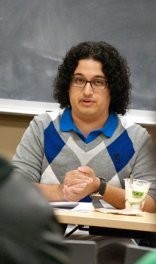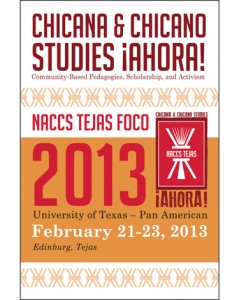From Dr. Ben Carrington’s Maymester Study Abroad trip to Leeds, England
Category Archives: Out of My Habitus
Out of My Habitus – “I’m Just Saying”: Students who “debate you” and undermine you through racial and gendered performances of “smartness”
By Juan Portillo
 If you’re a TA or professor, this has probably happened to you: a student in class challenges something you are teaching and ends their spiel by saying: “I’m just saying…,” leaving the ball in your court. For many, this may be an uneventful conversation between a professor in a position of authority and a student. But what if what they’re “just saying” is not harmless? What if it is part of an epistemically violent strategy to “perform smartness” and undermine the TA or professor along the lines of gender and race? As Deborah Tannen writes in Gender and Discourse: “social relations as dominance and subordination are constructed in interaction” (Tannen, 1996, p. 10), and often when students feel challenged by feminist and anti-racist discourses they can resort to a claim of power by delegitimizing the TA or professor. They do this by invoking white-centric, andro-centric, and heteronormative knowledge and claim that they are “just saying” it, normalizing it and making you appear as different and not normal. In this post, I locate these issues with respect to: (a) what the students think they know as the “official” knowledge; and (b) how they perform their “smartness” to try to place female and non-white TAs and professors as illegitimate holders of knowledge. I am writing this post in the spirit of self-preservation as someone who has had to deal with this, and as a way to spark strategic alliances within our department to disrupt what the students are “just saying.” In particular, it was a recent experience with a white, heterosexual, male, middle-class student who wanted to debate me on the existence of reverse racism that sparked the idea to write this post.
If you’re a TA or professor, this has probably happened to you: a student in class challenges something you are teaching and ends their spiel by saying: “I’m just saying…,” leaving the ball in your court. For many, this may be an uneventful conversation between a professor in a position of authority and a student. But what if what they’re “just saying” is not harmless? What if it is part of an epistemically violent strategy to “perform smartness” and undermine the TA or professor along the lines of gender and race? As Deborah Tannen writes in Gender and Discourse: “social relations as dominance and subordination are constructed in interaction” (Tannen, 1996, p. 10), and often when students feel challenged by feminist and anti-racist discourses they can resort to a claim of power by delegitimizing the TA or professor. They do this by invoking white-centric, andro-centric, and heteronormative knowledge and claim that they are “just saying” it, normalizing it and making you appear as different and not normal. In this post, I locate these issues with respect to: (a) what the students think they know as the “official” knowledge; and (b) how they perform their “smartness” to try to place female and non-white TAs and professors as illegitimate holders of knowledge. I am writing this post in the spirit of self-preservation as someone who has had to deal with this, and as a way to spark strategic alliances within our department to disrupt what the students are “just saying.” In particular, it was a recent experience with a white, heterosexual, male, middle-class student who wanted to debate me on the existence of reverse racism that sparked the idea to write this post.
The student mentioned above (not a direct student of mine) was not the first one to question what I thought or knew with regards to a topic that was uncomfortable for him (“does reverse racism exist?”). However, what impacted me the most was the way the student was shut off from learning anything. He was already set in what he “knew” about the word “racism” and what the official dictionary and other texts said, how he believed in equality as sameness, and how my knowledge was less legitimate than his. While he identified my ways of knowing as coming from feminist and non-white authors/texts (which he hinted at as being biased), he never situated his own knowledge as stemming from authors with white and male bodies who had already filtered and shaped that knowledge through their experience of the world. Moreover, he accused me of getting too agitated, of not being civil in the discussion, and pointed to his own behavior as calm and civil, which he highlighted as something that I should appreciate because as a white man he was taking interest “my” topic. While I can admit I was upset because he was: (a) positioning me as an illegitimate holder of knowledge, and (b) making me seem uncivilized and fiery, he was reacting to the way I challenged him and his beliefs. In particular, I started pointing out his own way of speaking to me and how that was a strategy to position me as less legitimate than he. I also sarcastically thanked him for taking interest in issues of race, which disrupted his “white savior” mentality. In addition, he was also reacting to how I tried to explain that we live in a white supremacist system that is, as bell hooks writes, an ideology that overlays how white people interact with people of color, characterized by moving away from overtly racist acts yet still maintaining an attitude of superiority and control (hooks, 2003). I disrupted his performance of “smartness” (which I elaborate below) and his “official knowledge” by pointing out how they are rooted in a heterosexist, white supremacist system, and apparently that made me uncivilized. Why did this interaction unfold this way?
Paula Moya writes in Learning From Experience: Minority Identities, Multicultural Struggles (2002) that when interviewing for her position at Stanford University in the English department, the Dean questioned her legitimacy and her belonging by asking her why she felt she would fit in an English department and not a Chicano Studies or Women’s Studies one. She uses this example to point out how a seemingly “neutral” field such as English is really characterized by bodies that are white, often male, and class-privileged. Therefore, according to Moya, these situations reveal how female and non-white faculty are seen as embodying subjective and non-relevant knowledge at odds with “whitestream” (Urrieta Jr., 2009) schooling. Nirmal Puwar writes that the presence of bodies who are not the “somatic norm” usually “disturbs and interrupts a certain white, usually male, sense of public institutional place” (Puwar, 2004, p. 42). This leaves faculty and TAs who are not “the somatic norm” of the academy (Puwar, 2004) (i.e. white, male, middle-class) vulnerable to questioning by students, faculty and staff who embody maleness and whiteness. This extends even to female and non-white students who adopt masculine and white mannerisms (Bourdieu, 2010) in order to distinguish themselves and delegitimize female and non-white professors or TAs. These mannerisms convey a particular way of performing how “smart” you are in opposition to those who think are you not, as explained next.
In Smartness As A Cultural Practice In Schools (Hatt, 2011), Beth Hatt explains that what we think of as “smart” is not just an ideology or discourse, but also a practice or performance. Moreover, she writes that smartness “is something done to other as social positioning” (Hatt, 2011, p. 2). In other words, education institutions are cultural spaces where being smart is tied to the recognition of certain cultural behavior, where students with particular social capital are identified as smarter than those who lack it. By observing a kindergarten class, Hatt reveals that the teacher organized and hierarchized students by measuring how well they “behaved” according to a white, middle-class expectation. The students themselves identified this hierarchy in terms of “smartness,” where quiet and assertive white students were rewarded while loud and hyperactive black students were punished. In the end, Hatt suggests that in a hierarchical educational system, students are judged by how well they perform whiteness, including their verbal and non-verbal communication patterns. This is in line with other research that shows that judging students of color as “loud” and “out of control” is a way to differentiate students of color as “bad students” when compared to white students (Garcia, 2010; Hatt, 2011; Hyams, 2000; Lewis, 2004; Urrieta Jr., 2009).
To Hatt’s analysis I would add that there is a gender component to this performance of smartness as well, which does not exist in isolation but rather in relation to race, social class, and other identities. Deborah Tannen writes in Gender and Discourse that “misunderstandings can arise in conversation, both cross-cultural and cross-gender, because of systematic differences in communicative style” (Tannen, 1996, p. 5). She believes that men and white people will claim superiority by judging how women and non-whites fail to communicate in the way that they do (e.g. listening as opposed to debate). Women of color, often stereotyped as the “fiery Latina,” “dragon lady,” and “angry Black woman,” learn early on in school that they must perform their raced femininity in very narrow and specific ways to avoid being punished out of school (Hyams, 2000; Lei, 2003; Portillo, 2012). This stems from anxieties over stereotypes of women of color, particularly Latina and Black young women, as being “out of control” (Garcia, 2010). The moment they step out of a submissive performance, they are positioned as uncivilized and anything they have to say is delegitimized and discounted.
One clear example was documented by Kevin Leander (2002) in his article Locating Latanya: The Situated Production of Identity Artifacts in Classroom Interaction. Leander aimed to understand how cultural artifacts and discourses circulating in the classroom semiotically mediated students’ identities “as a means of marking power relationships” (Leander, 2002, p. 203). During a “Derogatory Terms Activity,” students were asked to discuss language and power issues by writing insults on a banner that everyone could see. Latanya, one of the only Black, female students in class, added the word “honkey” to the banner. Immediately, white, male students began pointing to how the word “honkey” was not reprimanded the way “nigger” was, hinting that there was reverse racism and that Black people like to pretend they are only victims. As Latanya became uneasy because of the way she was being positioned as a “reverse racist” and because white students were saying the word “nigger” and portraying themselves as victims, other Black students jumped in and demanded that she stopped “acting ghetto.” Latanya became more upset as she began to be disciplined by other Black students who understood the consequences of being loud and disagreeable in a classroom setting characterized by white sociocultural values. Moreover, the white students said that they were speaking in “generalities,” with a body language that clearly stood in juxtaposition to Latanya’s. In the end, the white, male students succeeded in portraying Latanya as an out of control, Black woman, while portraying themselves as calm, rational, and “[constructing] an embodied artifact of [themselves] as ‘good student,’ facing forward and addressing the teacher” (Leander, 2002, p. 219). The author writes about the response of one of the white, male students: “From a relational perspective on social space, Ian was not simply projecting a separate space from Latanya but suggesting the relative power of his (institutional classroom) space with respect to Latanya’s (taboo, banner) space” (Leander, 2002, p. 219).
Racialized and gendered assumptions of self-display and self-control shape how “the consequences of style differences work to the disadvantage of members of groups that are stigmatized in our society, and to the advantage of those who have the power to enforce their interpretations” (Tannen, 1996, p. 8). Thus, the educational identity of students is shaped by particular raced and gendered performances that limit the subjectivities of students who deviate from an idealized male, white, and middle-class norm, and empower those who embody and perform whiteness and maleness. In my own example, the student resorted to labeling me (explicitly) as angry, while labeling himself as calm and seeking a civilized conversation. This was a performance of “smartness” through behavior that depends on both his embodiment of whiteness and maleness and his relation to my brown body and my feminism. It was a way to claim power created dialogically in our interaction but drawing from the way his embodied knowledge is privileged over mine. Moreover, it had a gendered component, as he relied on a performance of hegemonic masculinity that aimed to be a “savior” if only my feminist ideas would cut him some slack.
How to disrupt this? I personally have two approaches, and I welcome more ideas in the comments section. The first is to recognize the value of knowledge created from experiencing the racial, gender, sexuality, class, and ability bias of the world. Moya asserts that certain bodies have “epistemic privilege” which “refers to a special advantage with respect to possessing or acquiring knowledge about how fundamental aspects of our society (such as race, class, gender, and sexuality) operate to sustain matrices of power” (Moya, 2002, p. 90). In other words, people who are marginalized by heteropatriarchy and white supremacy have access to knowledge about how these systems of oppression work that people who derive privilege from them will not know. Secondly, I tend to draw attention to how the students try to “debate” from a position of privilege. Paying attention to and calling out their discursive practices throws students out of the loop and with any luck in a more receptive state.
I write this blog in an interest of self-preservation. Having anyone question your legitimacy in the academy because your knowledge is not “official” or too biased can be very dehumanizing and painful. The intersection of race and gender (as well as other identities that I have not included here and thus limit my own analysis) can result in specific experiences of inadequacy in an environment where even undergraduate students can hold on to racial and gender privilege to position you as subordinate to them. This is even more aggravating when students, colleagues, and professors make you feel like you are uncivilized, fiery, angry, agitated, and otherwise not as calm as they are. These people hide behind a “I’m just saying…” strategy where they invoke “official” knowledge (whether it’s a dictionary definition or canonized theories) to mark the Other as subordinate in the classroom. Recognizing how ALL of our experiences and embodiments affect and filter what we know and how we know it would be a great step towards making our department, our field, and our university more inclusive. This should be paired with a recognition of power dynamics to avoid a democratization of oppression where white men can claim oppression based on their race and gender, but also where people of color and women can realize how they/we have a stake in and support white supremacist and heteropatriarchal epistemologies.
References
Bourdieu, P. (2010). Distinction: A Social Critique of the Judgment of Taste. (R. Nice, Trans.). New York, NY: Routledge.
Garcia, L. (2010). Respect Yourself, Protect Yourself: Latina Girls and Sexual Identity (Kindle.). New York, NY: NYU Press.
Hatt, B. (2011). Smartness as a Cultural Practice in Schools. American Educational Research Journal, 1–23. doi:10.3102/0002831211415661
hooks, bell. (2003). Teaching Community: A Pedagogy of Hope (1st ed.). Routledge.
Hyams, M. S. (2000). “Pay attention in class…[and] don’t get pregnant”: a discourse of academic success among adolescent Latinas. Environment and Planning A, 32, 635–654.
Leander, K. M. (2002). Locating Latanya: The Situated Production of Identity Artifacts in Classroom Interaction. Research in the Teaching of English, 37, 198–250.
Lei, J. (2003). (Un)Necessary Toughness?: Those “Loud Black Girls” and Those “Quiet Asian Boys.” Anthropology and Education Quarterly, 32(2), 158–181.
Lewis, A. E. (2004). Race in the Schoolyard: Negotiating the color line in classrooms and communities (3rd Paperback.). Piscataway, NJ: Rutgers University Press.
Moya, P. M. L. (2002). Learning from Experience: Minority Identities, Multicultural Struggles. University of California Press.
Portillo, J. (2012, August). “Hips Don’t Lie:” Mexican American Female Students’ Identity Construction at The University of Texas at Austin. The University of Texas at Austin, Austin.
Puwar, N. (2004). Space Invaders: Race, Gender and Bodies Out of Place (1st ed.). New York, NY: Berg Publishers.
Tannen, D. (1996). Gender and Discourse. New York, NY: Oxford University Press, USA.
Urrieta Jr., L. (2009). Working from Within: Chicana and Chicano Activist Educators in Whitestream Schools. Tucson, AZ: University of Arizona Press.
Out of My Habitus – Why my education and manners get in the way of doing research
By Juan Portillo
Linda Tuhiwai Smith writes in Decolonizing Methodologies: Research and Indigenous Peoples that Western academia has historically engaged in a process of legitimizing “what counts as knowledge, as language, as literature, as curriculum and as the role of intellectuals” (Smith, 1999, p. 65). This process happens in an environment that envisions

researchers, data and the research process as cultureless and bodiless, “floating brains” if you will. The danger of doing research without thinking where our bodies and experiences fit in the process (with all of our privileges and disadvantages) is that our biases as humans will make it into our final conclusions, reproducing an intellectually stagnant body of knowledge that at best is very limited in its creativity and explanation, and at worst it has the potential of marginalizing the people we are writing about.
One way to address our limitations and acknowledge our humanity is to really think about our social location and our role as researchers. Pierre Bourdieu’s habitus is an excellent concept that can help to explain this dynamic and can prevent us from completely divorcing our bodies and biases from the research process. As researchers, we are embedded in a social landscape that has provided us with dispositions that help us make sense of the world around us. Our habitus also provides us with the manners through which we express ourselves, inevitably reproducing

our class, gender, sexuality, ability, race/ethnic identity, etc. However, we don’t always pay attention to how our disposition and manners affect the way we interact with and learn from the data we collect or the people we interview and observe. I am starting this blog series in an effort to provide a tool for researchers at UT Austin to practice reflexivity and improve their interpretations of their research as well as their interactions with research participants.
While it is hard to really analyze ourselves and identify our class, gender, racial and other biases, sometimes situations arise that give us a chance to put ourselves under the microscope. We may enter a classroom, a restaurant, an interview or a lab where suddenly something feels off and we are forced to respond through limited improvisations that reveal our social location as well as that of others. These are the times, particularly in an academic or research setting, where we can truly examine our approach to knowledge, learning, and conducting research. Ultimately, this information about ourselves can potentially help us compensate for our limitations due to our privileges, or turn our feelings of marginality into sites for theorizing.
This first post will contain one example of a time I have felt “out of my habitus” and forced to deal with my discomfort and conduct myself in a way that helped me grow instead of responding in a way that legitimized only my “expert” version of the social world. Recently, I attended the National Association of Chicano/Chicana Studies regional conference at UT Pan American in Edinburg, Texas. During this conference, I attended a workshop that  taught us to link the knowledge we have gained from our parents and grandparents to the way we approach education in our current position. Most of the over 20 people participating in the workshop were first generation college students, all of them were Chicana/o, and most of them were female. All had immigrated to the United States while they were still young and the ones who had been here for a few generations had been marginalized because of their race, gender and class while attending school. Many had parents who were farm workers or low-wage workers. As I filled in the questions that were part of the exercise, I realized I am probably a 5th generation college graduate, I attended private school in San Salvador (El Salvador), and came to the United States over 9 years ago to pursue higher education.
taught us to link the knowledge we have gained from our parents and grandparents to the way we approach education in our current position. Most of the over 20 people participating in the workshop were first generation college students, all of them were Chicana/o, and most of them were female. All had immigrated to the United States while they were still young and the ones who had been here for a few generations had been marginalized because of their race, gender and class while attending school. Many had parents who were farm workers or low-wage workers. As I filled in the questions that were part of the exercise, I realized I am probably a 5th generation college graduate, I attended private school in San Salvador (El Salvador), and came to the United States over 9 years ago to pursue higher education.
I was definitely “out of my habitus” during this exercise, and I felt irked. I had a hard time really making sense of why I felt out of place, or why I felt bothered. However, this discomfort was an opportunity for me to engage with my privileges and be very mindful of my manners (including the way I looked/dressed, my language, my accent, my responses, my body language, etc.). After hearing someone talk about how they felt like their family was jealous or angry because she was pursuing a higher education (calling her white-washed and insinuating that she looked down on them), I thought about the costs to entering higher education, as a student and as a researcher. The costs for the people in this workshop (true of me as well) involve entering a new habitus and learning or adopting new mannerisms and dispositions to survive a competitive, middle-class, heteronormative and in many ways white supremacist (colonizing) environment. These mannerisms shine through in our way of speaking and writing, in the way we relate to others, in the way we assign importance to academic matters, and in the way we distance ourselves from whatever image of “bad” student we have.
In a country where students tend to be labeled as “bad” when they don’t give school as much importance as we do, where having an accent or not speaking the right version of English marks people as deviant students, and where the students who are marked the most often as “bad” students embody a particular look and mannerisms (Urrieta Jr., 2009; Valenzuela, 1999; Yosso, 2005; Yosso, Smith, Ceja, & Solorzano, 2009), then adopting the manners and dispositions of “good” students inevitably results in coming off as pretentious (as Bourdieu describes the petit bourgeoisie). Moreover, being successful in education demands that we participate in a process that distinguishes between the “good” and the “bad” students, a process of hierarchization characterized in some ways by our behavior (which I have heard undergrads at UT talk about it as “white-washing,” telling girls they’re acting too much like men, Mexican Americans telling other Mexican Americans that they’re acting “too Mexican,” or labeling certain students as disingenuous or pretentious).
Thus, being out of my habitus made me be mindful of how I was coming across to the people in that workshop. While I was irked, I decided to really listen to what was going on, and this allowed me to make a connection between the process of schooling and how my position as a researcher is mired with pretentions and manners that can be and often are marginalizing to others. Similar to (though not fully alike) the way one of the participants expressed discomfort with the way her family and friends thought she was pretentious because she was getting a college degree, my “credentials” and manners can result in research participants feeling marginalized or looked down on. Being conscious of this is one way to: (a) not blame the people I interact with for being hostile or unsupportive in my research projects; and (b) find ways to prevent myself as much as I can from marginalizing research participants and other people around me.
References:
Smith, L. T. (1999). Decolonizing Methodologies: Research and Indigenous Peoples. New York, NY: Zed Books.
Urrieta Jr., L. (2009). Working from Within: Chicana and Chicano Activist Educators in Whitestream Schools. Tucson, AZ: University of Arizona Press.
Valenzuela, A. (1999). Subtractive Schooling: U.S. Mexican Youth and the Politics of Caring. Albany, NY: State Univ of New York Press.
Yosso, T. J. (2005). Whose culture has capital? A critical race theory discussion of community cultural wealth. Race Ethnicity and Education, 8(1), 69–91. doi:10.1080/1361332052000341006
Yosso, T. J., Smith, W. A., Ceja, M., & Solorzano, D. G. (2009). Critical Race Theory, Racial Microaggressions, and Campus Racial Climate for Latina/o Undergraduates. Harvard Educational Review, 79(4), 659–690.
Juan was born and raised in San Salvador, El Salvador. He has a BBA in marketing from UT Austin, and a Master’s in Women’s and Gender Studies from UT Austin. His research interests include Chicana feminisms, anti-colonial methodologies, Mexican American / Latina college students’ experiences, and Latinas and the media.
























